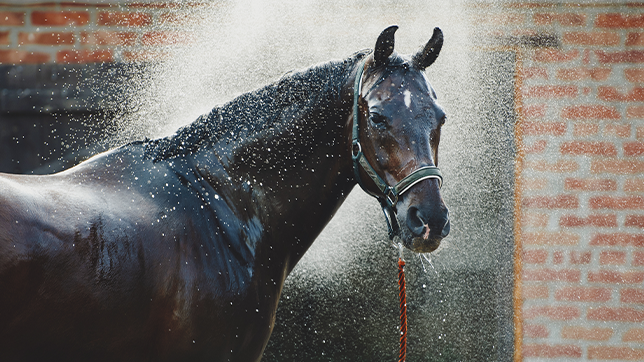17th June 2024
Heatstroke in horses - Top 10 tips for keeping horses cool in the summer

Summer’s finally here – we can wave goodbye to muddy gateways and enjoy riding in dry weather for a change!
However, sunshine equals heat, and the sudden increase in temperature can have a negative impact on our horses; unless we keep them cool.
In this article, we’re going to explore the signs of heatstroke and how to help your horse if they suffer from it. We’ll also be unveiling our top 10 tips for keeping your horse cool, with handy hints from experienced horse owners within the Animal Friends team…
Top 10 tips for keeping your horse safe during a heatwave
Check out these top tips from a few of the experienced horse owners within the Animal Friends team:
1. “I read a study that said a wet, white fly rug keeps a horse coolest. So, if it’s going to be a scorcher, I wet my horse’s white fly rug in the morning. Then, I go back at lunchtime and in the evening to wet his rug again, because it dries quickly when it’s very hot.”
2. “For hydration, we use Saracen’s Recovery Mix, as that gets so much water into him.”
Remember: Speak to your vet for advice before making sudden changes to your horse’s diet!
3. “In our stables we have skylights, which are great for natural light in the winter but make it a sauna in the summer – so, they get covered with dark mesh to keep the stables cooler.”
4. “Tubbing their feet in water to try and stop feet drying out and shoes getting lose, as well as using a good moisture balm.”
5. “We set fans up in front of our horses’ stables when they’re in during hot weather (they don’t have much shelter in their field); which also helps keep flies away!”
6. “Adding a splash of apple juice to their water buckets can help to encourage them to drink more (though we don’t do that for our lamimitis prone Welsh cob).”
7. “I hose them morning, afternoon (during my lunch break), and evening, including mane and tail.”
8. “We make sure they have fresh water and a lot of it, though we also have a natural stream they go in all the time in hot weather.”
9. “Put suncream on before turning them out! My horse won’t keep a fly mask with nose protection on, so I have to use a thick layer of suncream on his white muzzle or he’ll burn really badly.”
10. “Freezing some carrots (sliced lengthways, to prevent choke) in small tubs of water is fun to do. I then put those carrot ice blocks in a bucket in their stables – keeps my horses entertained, increases their water intake a little, and helps them stay cooler.”
Heatstroke in horses
Exercising in hot weather is a major cause of heatstroke, and other heat-related illnesses, in horses. Sometimes, heatstroke can be caused by exposure to humid conditions, stress, or lack of ventilation, too.
Horses are at risk of suffering from heatstroke when their body temperature is too high, which could lead to organ failure. Sadly, heatstroke can be fatal if not treated quickly enough.
Here are some of the signs your horse may be suffering from heatstroke, heat exhaustion, or another heat-related illness:
- Reluctance to work.
- Excessive sweating.
- Fast, shallow breathing.
- Flaring nostrils.
- Decreased appetite.
- Stumbling or unsteadiness.
- Colic.
- Bizarre behaviour, e.g. suddenly becoming panicked for no apparent reason.
Heatstroke symptoms can appear suddenly, without warning – so, it’s vital to stay vigilant and monitor your horse’s wellbeing in hot weather.
What to do if your horse is suffering from heat-related illness
Step 1 – Call a vet immediately and follow their instructions.
Step 2 – Move your horse to a calm, cool, shaded area.
Step 3 – Provide plenty of cool, fresh drinking water, though don’t let your horse drink too much too quickly.
Step 4 – Continuously apply cold water to their body until the vet arrives.
Which horses are most at risk during a heatwave?
- Horses being exercised in the heat.
- Overweight horses.
- Foals and young horses.
- Veteran (older) horses.
- Horses of larger breeds.
- Horses with respiratory conditions, e.g. asthma.
- Horses with health problems, e.g. Cushing’s disease.
- Horses with thick coats.
- Horses wearing heavy rugs.
- Horses being transported in hot conditions.
- Horses turned out onto fields without appropriate shelter.
- Horses whose stables don’t have adequate ventilation.
- Horses who are unaccustomed to exercising in hot and/or humid conditions.
When is weather too hot for horses?
Each horse is a unique individual with their own levels of tolerance for hot weather conditions. But, generally, horses living in the UK are unlikely to cope with being exercised when temperatures rise beyond 28°C – though in humid conditions, this temperature will be much lower.
Keeping your horse cool during hot weather is essential to prevent them suffering from heat-related illnesses, like heatstroke.
To discover more detailed advice on keeping your horse cool during a heatwave, please visit our article about caring for your horse in hot weather.
Looking for more horse advice?
Support and advice so that owners and riders can take the very best care of their equine.
Need horse insurance?
Horse insurance can help cover the cost of veterinary treatment if your horse gets injured or falls ill.
